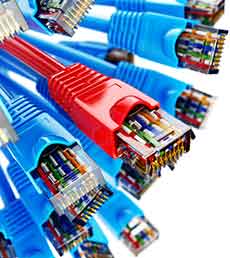Wired networks are generally considered to be more secure and reliable than wireless networks for business environments. They are less susceptible to interference and signal loss, and they offer faster data transfer speeds. Additionally, wired networks can be easier to set up and maintain, and they don’t require batteries or power outlets. However, wired networks can be less convenient than wireless networks because they require physical connections to be made between devices, which can be limiting in terms of device placement and mobility.
Wired networks use cables to connect devices to a network, such as Data Cabling. This physical connection provides several benefits over wireless connections.
- Speed: Wired connections typically offer faster data transfer speeds than wireless connections. This is because wired connections do not have to contend with the same level of interference and signal loss that wireless connections do. This is particularly important for businesses that rely on real-time data transfer and require high-bandwidth applications such as video conferencing, file sharing, and online backups.
- Security: Wired networks are generally considered to be more secure than wireless networks. It is harder to intercept a wired connection than a wireless connection, and wired connections are less susceptible to hacking and other forms of cyber attacks. Businesses often have sensitive data that needs to be protected and wired networks provide an additional layer of security.
- Scalability: Wired networks can be more scalable than wireless networks. Businesses can easily add more devices to a wired network by simply adding more Ethernet ports. Wireless networks, on the other hand, may require additional access points or other hardware in order to accommodate more devices.
- Reliability: Because wired connections are not affected by interference or signal loss, they tend to be more reliable than wireless connections. This means that wired networks can sustain a connection for longer periods of time without interruption.
- Ease of Management: Wired networks are generally easier to set up and manage than wireless networks. This is because wired networks do not require any additional hardware, such as wireless routers or access points, in order to function. This can be particularly beneficial for businesses that have a large number of devices that need to be connected to a network.
The choice between wired and wireless networks will depend on the specific needs of the individual or organization. Wired networks are often preferred for business environments due to their speed, reliability, security, scalability, ease of management, and cost-effectiveness. However, it is important to note that every business has its own specific needs and requirements, and it is essential to evaluate the pros and cons of both wired and wireless networks in order to make the best decision for your business.



